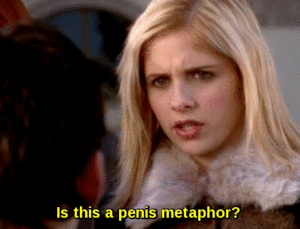You're spot on about the more sinister backdrop of what it means to be a slayer and her freedom of choice. It's hard to elaborate without spoilers though because this is such a big part of the upcoming story.
I will say this though. There are two basic elements to Buffy (both the character and the series overall): what it means to grow up and how to define an independent woman. The coming of age thing is the main focus of the high school years and the feminist-positive elements become the main focus of the later seasons -- even though there's plenty of 'girl power' to be had in the first three seasons and she never stops growing up.
To this end, season 3 is where the two come together specifically in the form of choice. Part of becoming an adult is choosing what kind of adult. Specifically, with you be rebellious and independent and think for yourself? Or will you be obedient and only do what you're told?
Then there's the other aspect of this, which is those who have influence over you and those choices you make. In this case, I'm talking about Giles, obviously. And, like you were saying, both Quentin and Post tell him he's become too attached. He's raising her out of love and support instead of duty and derision. He embraces her idiosyncrasies and uniqueness and never her scolds her or tells her out to act. You can see this all the way back in their first meeting in the pilot. She makes the joke about the free Time Life phone. And Giles plays along. Quentin or Post would probably have scoffed and scolded her because there is no place for levity in the slayer business. Giles lets Buffy be Buffy. He never forces her to be
The Slayer. He treats her like she's her own person. An individual. An independent woman - certainly not the disposable instrument* the Council expects her to be. This will factor heavily in choices she's going to have to make.
*This where that whole deliberately patronizing bit I keep going on about with the "one girl in all the world." It's the Watchers' way of keeping the slayers in their place. They are disposable and they have a very limited shelf life. If you never expect them to become strong, independent women, then you'll never have to worry when they don't. And if you stay detached, you can treat them like an assembly line. One dies and along comes the next one in the queue.
Without going into specifics, of course, the big endgame with the femist-positive angle to the show is basically one giant 'fuck you' to the patriarchy. Helpless is the first big glimpse of this because it really contrasts what it means to really be a father instead of just being an indifferent patriarch.
The Zeppo is one of my favorites though. It is actually nice to root for Xander once and awhile.
Yes, Buff.

 Ooookay, I think I got it. Totally confused me there for a second.
Ooookay, I think I got it. Totally confused me there for a second.